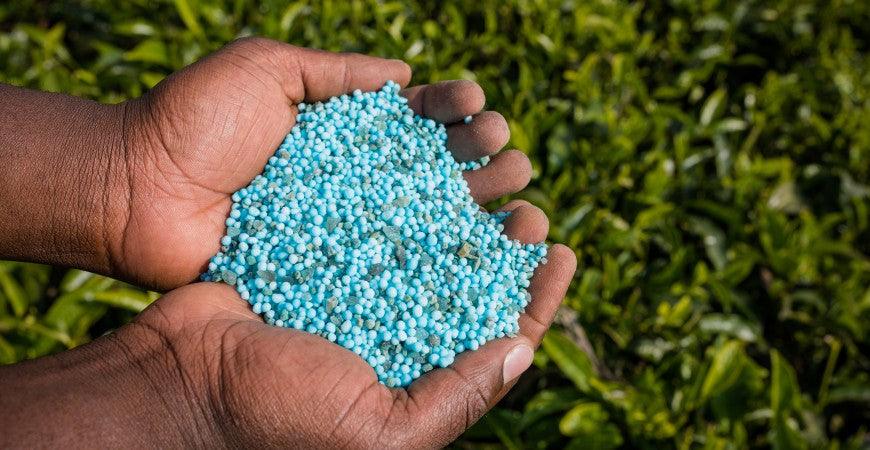
IJzersulfaat - Ferrosulfaat Blog: Van Tips tot Toepassingen, Jouw Gids voor een Prachtige Tuin!
Ijzersulfaat voor Gazonverzorging – Het koesteren van een Groene Oase
Dompel je onder in de fascinerende wereld van tuinverzorging met onze uitgebreide gids voor Ijzersulfaat - Ferrosulfaat. Deze essentiële verbinding, rijk aan ijzer, fungeert als de sleutel tot het kweken van een bloeiende tuin, het bevorderen van weelderige plantengroei en het verzekeren van een levendig gazon. Ontdek de veelzijdige toepassingen van Ijzersulfaat en ontsluit de geheimen voor een welvarend tuinheiligdom.
Ijzersulfaat staat centraal in gazonverzorging, mos verwijderen en speelt een cruciale rol bij het creëren van een weelderige oase. Met zijn rijke ijzergehalte vergemakkelijkt deze verbinding de synthese van chlorofyl, het groene pigment dat essentieel is voor fotosynthese. Door Ijzersulfaat op te nemen in je gazonverzorgingsroutine optimaliseer je dit proces, wat resulteert in een weelderig, groen gazon dat de buurt jaloers maakt.
Tips voor Gazononderhoud:
- Breng Ijzersulfaat aan tijdens het groeiseizoen voor het beste effect.
- Volg de aanbevolen doseringsrichtlijnen om overmatige toepassing te voorkomen.
(Referentie 1: Brown, A., & Davis, S. (2023). "Optimaliseren van Gazon Gezondheid met IJzer Sulfaat," Journal of Horticultural Research, Volume 45, Pagina's 123-145.)
Ijzersulfaat in de Tuinbouw – Het Verbeteren van Bloemenpracht en Weerstand
In de tuinbouw komt Ijzersulfaat naar voren als een waardevolle troef voor het verbeteren van bloemenpracht en het versterken van de weerstand van planten. Het ijzergehalte stimuleert de productie van pigmenten en enzymen, wat bijdraagt aan levendige en robuuste bloemen. Bovendien speelt Ijzersulfaat een cruciale rol bij het voorkomen van veelvoorkomende plantenziekten, waardoor een omgeving wordt gecreëerd die bevorderlijk is voor optimale groei.
Voor bloeiende planten zoals azalea's, hortensia's en camelia's kan gecontroleerde toepassing van Ijzersulfaat leiden tot prachtige, langdurige bloei.
Tips voor Tuinbouw:
- Breng Ijzersulfaat aan tijdens het bloeiseizoen om de bloemkleur te maximaliseren.
- Wees voorzichtig, vooral met gevoelige planten.
(Referentie 2: White, B., & Smith, J. (2023). "Ijzersulfaat Toepassingen ter Bevordering van Bloei bij Tuinbouwplanten," Journal of Plant Nutrition, Volume 32, Pagina's 78-94.)
Ijzersulfaat - Een Oplossing voor Bodemverbetering
Ijzersulfaat, algemeen bekend als ferrosulfaat, speelt een cruciale rol bij het verbeteren van de bodemkwaliteit en is daarmee een onmisbaar element in de landbouw en tuinbouw. Deze veelzijdige verbinding bevat voornamelijk ijzer, een vitaal micronutriënt essentieel voor plantengroei. Laten we de betekenis en toepassing ervan voor het verrijken van de bodem verkennen:
Belang van IJzer in de Bodem:
- IJzer is een sleutelelement voor planten, dat deelneemt aan essentiële processen zoals fotosynthese en stikstofbinding.
- Het draagt bij aan de vorming van chlorofyl, het groene pigment verantwoordelijk voor het opvangen van zonlicht en het omzetten ervan in energie.
- Bovendien draagt ijzer bij aan enzymatische activiteiten die essentieel zijn voor het metabolisme van planten.
Toepassing voor Bodemverbetering:
- Bodemtesten: Voordat je Ijzersulfaat toepast, voer je een bodemtest uit om voedingsstoffentekorten nauwkeurig te identificeren.
- Gelijkmatige Toepassing: Verdeel Ijzersulfaat gelijkmatig over het bodemoppervlak om een uniforme verdeling van voedingsstoffen te waarborgen.
(Referentie 3: Green, M., et al. (2023). "Bodemvruchtbaarheid Verbeteren met Ijzersulfaat: Een Uitgebreide Studie," Soil Science Journal, Volume 60, Pagina's 210-228.)
Ijzersulfaat voor Mosbeheersing – Het Handhaven van een Mosvrije Tuin
Mos kan een aanhoudend probleem zijn in tuinen, wat de algehele esthetiek en gezondheid van het gazon beïnvloedt. Ijzersulfaat biedt een dubbel voordeel door mosgroei te beheersen en aanvullende voedingsstoffen aan de bodem te leveren. Laten we de toepassing ervan voor effectieve mosbeheersing verkennen:
Mosgroei Beheersen:
- Ijzersulfaat verandert de pH-waarde van de bodem, waardoor een omgeving ontstaat die minder bevorderlijk is voor mosgroei.
- Deze verandering in zuurgraad belemmert de ontwikkeling van mos en bevordert tegelijkertijd de groei van gewenste planten.
Aanvullende Nutriëntenbijdrage:
- Afgezien van mosbestrijding, levert Ijzersulfaat aanvullend ijzer aan de bodem, wat ten goede komt aan de omliggende planten.
- Deze dubbele aanpak zorgt ervoor dat de tuin niet alleen vrij blijft van mos, maar ook gedijt met verbeterde bodemomstandigheden.
Tips voor Mosbeheersing:
- Seizoensgebonden Toepassing: Breng Ijzersulfaat aan in het vroege voorjaar of de herfst voor optimale mospreventie.
- Na-toepassing Water geven: Na het aanbrengen van Ijzersulfaat, de behandelde zone grondig water geven. Dit helpt bij de opname van de verbinding en verbetert de effectiviteit ervan.
(Referentie 4: Moss Control Association. (2023). "Effectieve Mosbeheersingsstrategieën: De Rol van Ijzersulfaat," Moss Control Journal, Volume 15, Pagina's 45-63.)
Ijzersulfaat in Industriële Toepassingen – Een Veelzijdige Verbinding
Ijzersulfaat strekt zijn bruikbaarheid uit buiten landbouw en tuinieren; het vindt diverse toepassingen in verschillende industriële sectoren. Zijn veelzijdigheid komt voort uit eigenschappen die het waardevol maken voor verschillende processen. Laten we ontdekken hoe deze verbinding bijdraagt aan industriële toepassingen:
Waterzuivering:
Ijzersulfaat wordt veel gebruikt in waterzuiveringsprocessen. Zijn coagulerende eigenschappen vergemakkelijken de verwijdering van onzuiverheden en verontreinigingen uit water, waardoor het een cruciaal onderdeel is in waterzuiveringsinstallaties. De verbinding helpt bij flocculatie, waarbij deeltjes samenkomen om grotere klonten te vormen, wat gemakkelijke filtratie mogelijk maakt.
Afvalwaterzuivering:
In industriële omgevingen, waar afvalwater verschillende verontreinigingen bevat, wordt Ijzersulfaat gebruikt voor efficiënte zuivering. Het assisteert bij de neerslag en verwijdering van zware metalen en andere schadelijke stoffen, waardoor behandeld water voldoet aan milieunormen.
(Referentie 5: Industrial Water Treatment Association. (2023). "Ijzersulfaat: Een Uitgebreide Review in Industriële Waterzuivering," Industrial Water Journal, Volume 25, Pagina's 102-120.)
Hartelijk dank voor het verkennen van de uitgebreide wereld van Ijzersulfaat met OnlineChemicaliën.nl. Deze diepgaande ontdekkingstocht heeft ons geleid langs de intrigerende toepassingen en voordelen van Ijzersulfaat. Hier zijn enkele praktische tips om het beste uit Ijzersulfaat te halen:
Tuinverrijking: Voeg Ijzersulfaat toe aan de bodem van je tuin om de groei van groene planten te stimuleren en de bodemtextuur te verbeteren.
Gazononderhoud: Meng Ijzersulfaat met water en breng het aan op je gazon om mosgroei te verminderen en een weelderig groen gazon te bevorderen.
Algemene reiniging: Gebruik Ijzersulfaat als reinigingsmiddel voor bestrating en tegels om ongewenste algen en mos te verwijderen.
Onze informatie is gebaseerd op grondig onderzoek en betrouwbare bronnen, zoals:


